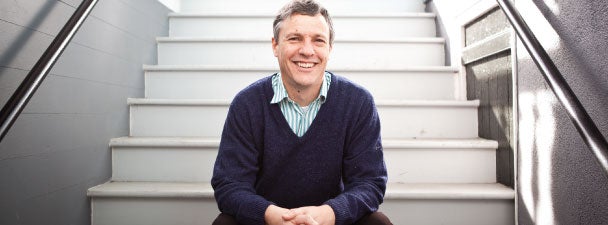Charleston isn’t just manners, magnolias and mansions. It’s not just hospitality, hoopskirts and horse-drawn carriages. Once you get past the grits and the gardens, the sweet tea and the cobblestone streets, it’s way more than meets the eye.
Except that it’s exactly what meets the eye.
“It’s the stuff that’s hidden in plain sight – the history that’s right there in the street names, the river names, the churches, everywhere,” says Simon Lewis, English professor and associate director of the College’s Carolina Lowcountry and Atlantic World (CLAW) program. “For so long, when people talked about the South, they weren’t talking about everybody in the South – they were leaving out a large population of who we are, a large portion of our history. But that’s changing. We’re telling a more inclusive history than ever before.
“Memory is on the move in South Carolina,” continues Lewis, who dubs himself the “intellectual impresario” of The Jubilee Project 2013, a spinoff of the CLAW program’s commemoration of the 150th anniversary of the Civil War. “This is an attempt to make people think of the South in a more inclusive way and give everybody credit for his or her part in our history.”
The Jubilee Project celebrates the 150th anniversary of the Emancipation Proclamation, the 50th anniversary of the desegregation of public education in South Carolina as well as other key events in 1863 (e.g., the Gettysburg Address and the attack on Ft. Wagner in Charleston Harbor) and 1963 (e.g., Martin Luther King Jr.’s “I Have a Dream” speech and the admittance of African American students into Clemson University, USC and Charleston County public schools). The celebration began on New Year’s Eve 2012, with African American churches all over the city ringing bells after the Emancipation Proclamation was read in their annual Watchnight services.
“It’s this simple idea of ringing in freedom,” explains Lewis. “Not only do you have this idea that the new year brings new hope and that we’re going to be better this year – it goes back to both January 1, 1808 [when slave importation into the U.S. was banned], and January 1, 1863: this sense of, ‘Come midnight, we’re free!’
“It goes along with the grand American theme of liberty, this theme of freedom for all, which is probably the most important consequence of the Civil War,” he continues. “It will be a critical commemoration. You can’t celebrate our achievements without looking at the messiness – what actually went on. But I think at this time we can commemorate with a sense of pride – with some confidence that we have made the achievement of liberty.”
With an exhibition at the Gibbes Museum of Art, presentations at the Southern American Studies Association and a performance by the Fisk Jubilee Singers, The Jubilee Project is a collaboration among many South Carolina organizations and agencies.
“A single stick is easily snapped, but bundle a bunch of sticks together, and you have something a whole lot stronger,” says Lewis. “So, together, we’re getting that collective impact.”
The goal is that it will nudge the perception of Charleston’s history into a more accurate, more inclusive context.
“When you think about it, Charleston is the most African of all United States cities. New Orleans and Detroit might argue with that, but I’d argue they are more African American. Charleston is more African,” says Lewis, who was born in England and raised in South Africa. “It’s time we break up people’s preconceived notions about our history so that we can start to get out of the old impasses that have held us back for so long. It’s time we be honest – and to celebrate – about what Charleston really is.”






